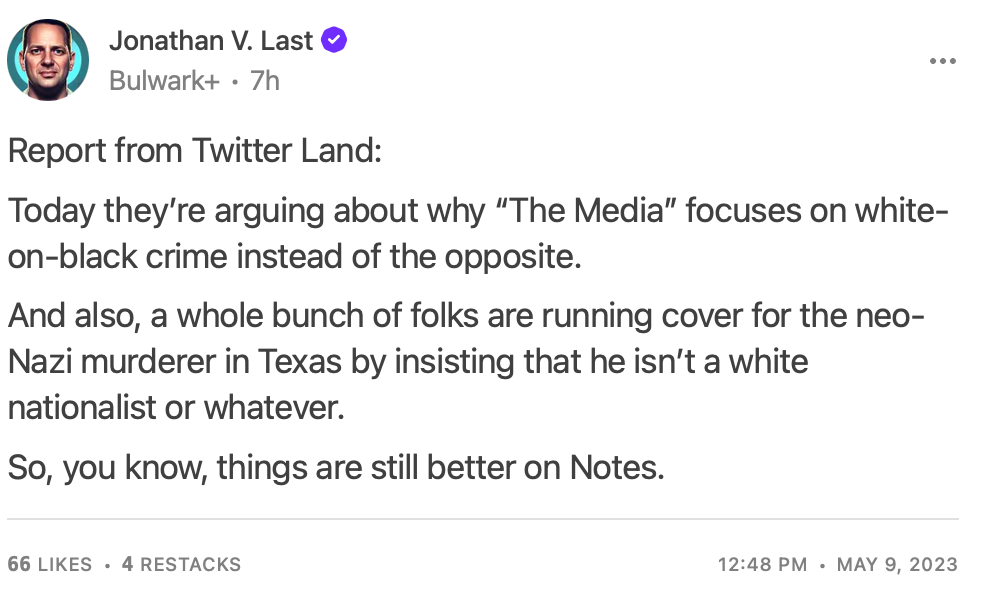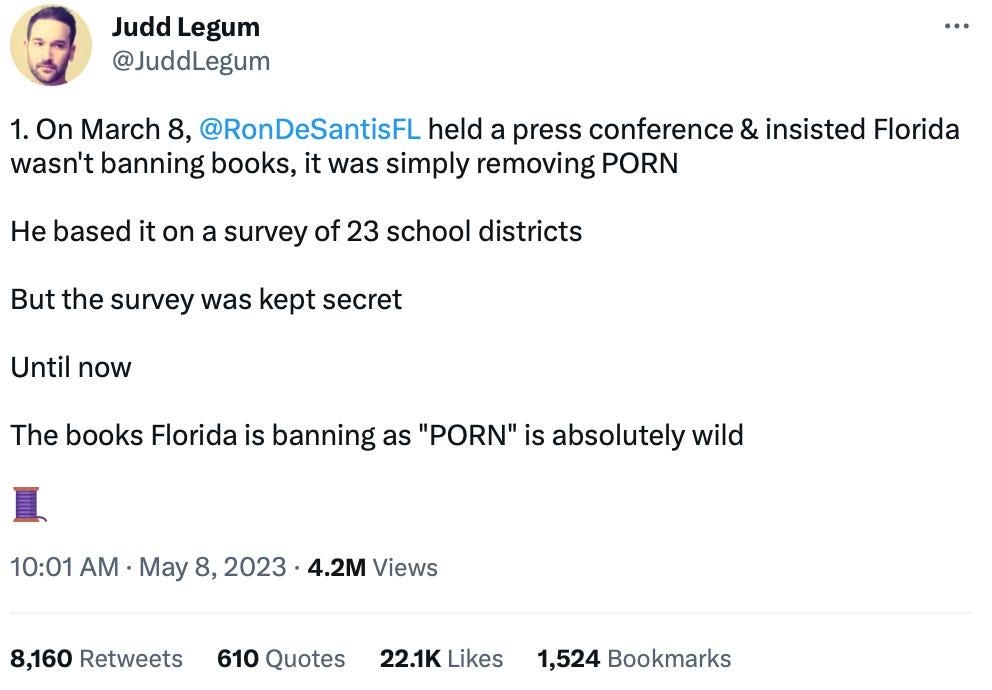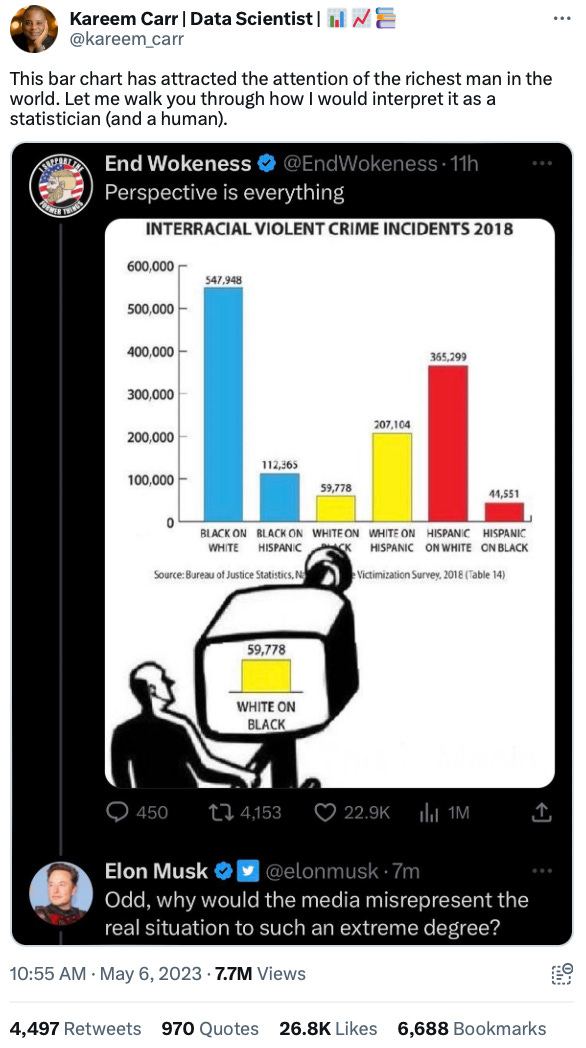The Discourse Report: May 9, 2023
Welcome to DiscRep, Berny Belvedere’s daily guide to the public discourse. Got something you think I should include in a future entry? Write me at berny@arcdigital.media. To discuss any of today’s items, post a comment below.
Articles
The Corruption of Lindsey Graham by William Saletan in The Bulwark
[W]hy focus on Graham?
First, because he was a central player in the Republican party’s capitulation to Trump. And second, because he talked constantly. He produced an enormous trove of interviews, speeches, press briefings, and social media posts. Through these records, we can see how he changed, week to week and month to month. We can watch the poison work.
It’s a slow death. The surrender to despotism doesn’t happen all at once. It advances in stages: a step, a rationalization. Another step, another rationalization. The deeper you go, the more you need to justify. You say what you need to say. You believe what you need to believe.
So let’s go back to the beginning. Let’s see who Lindsey Graham was before he drank the poison.
The New Washington Consensus by Franklin Foer in The Atlantic
Although Trump delivered vituperative speeches, inflected by xenophobia, about elites destroying American manufacturing, he didn’t really have any ideas about how to reverse course beyond jacking up tariffs. Biden’s national-security adviser, by contrast, put a big idea at the center of his speech. He extolled the virtues of industrial strategy: a new role for the state in directing the trajectory of the economy.
Industrial strategy begins with the premise that the national interest demands that certain industries flourish domestically. The United States can’t rely on, say, semiconductors produced in Taiwan when China could plausibly invade that island and abruptly cut off access to the chips that run every car, laptop, and weapon system. To bolster such essential sectors of the economy, industrial strategy uses public investment, in the form of tax credits and subsidies, to prod firms to produce goods that the public needs.
How Fox News and Trump Wrote the Playbook for Their Own Downfall by Catherine Rampell in The Washington Post
The arc of Fox’s rise, and its current challenges, are hardly unique to the media world.
There has been a long-term decline in trust across most U.S. institutions. This is a result of both actual errors committed by those storied institutions and concerted efforts by ambitious outsiders to oust the institutional insiders.
The story of Fox is similar to stories we’ve seen in politics, for example. In 2010, amid the fallout of the global financial crisis, the GOP’s tea party faction displaced some of the older “establishment” Republicans. Then the tea party itself was displaced by newer, fringier iterations in subsequent years, including the Freedom Caucus.
Which itself has had something of an identity crisis and appears to be splintering.
Trump’s rise was similarly premised on the idea that the GOP establishment was untrustworthy and had rigged the system. But, it’s hard to credibly run against “the establishment” once you’ve already had the most powerful job in the world.
Tucker Carlson’s Dark and Malign Influence Over the Christian Right by David French in The New York Times
Within conservative circles it has always been surprisingly difficult to tie a decline in Christian political virtue to the rise of Donald Trump. What seems obvious from a distance (wait a minute — didn’t Christians use to place a premium on the importance of character in politicians, especially during Bill Clinton’s scandals?) was less obvious up close. In countless personal conversations with Christians who are staunch Republicans, I heard some variation on the same plaintive question, “What do you want us to do? Hand an election to Hillary Clinton? Or to Joe Biden?”
For Democratic readers, that’s an easy choice. There’s no sacrifice in voting for Clinton or for Biden. But let’s turn the question around: Under what circumstances would you actually vote for your polar political opposite? How corrupt would a Democratic politician have to be to keep you home, make you vote third party or perhaps even cast a vote for a Republican who wants to ban most abortions and nominate Federalist Society lawyers to judgeships? Honestly exploring that question can perhaps help you sympathize with Republican Trump voters. When character conflicts with policy, voting choices can be hard.
But the Carlson question is different, and in some ways his loyal Christian support is even more troubling. What are the “lesser of two evils” or the “binary choice” arguments for sitting down and devoting an hour of your life, each night, to a cruel, dishonest man, much less hailing him as a “secular prophet”? The more the Christian right latches on to cruel men, the more difficult it becomes to argue that the cruelty is a bug, not a feature.
Notes
Tweets
Clips
Where Did Bed, Bath & Beyond Go Wrong? (Bloomberg)










I left Twitter after Musk was making fun of the Twitter employee who was just trying to find out if he was laid off. It struck me as cruel and just really mean. I didn’t leave to boycott or prove some kind of point; I just didn’t want to be a part of it anymore. Seeing tweets like these reinforce for me that I made the right call. The guy has many great corporate and engineering achievements attributable to him, but on a personal level, he’s insufferable. Wokeness is an issue, I would argue monolithic anti-wokeness is maybe worse though. Some of these people just lose their tether to reality.